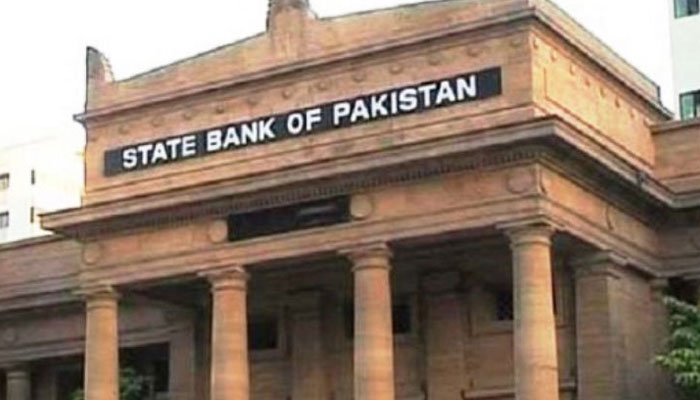Monetary policy rate: MFPCB meeting not convened since August 2019
ISLAMABAD: While keeping policy rate unchanged at 13.25 percent that is the domain of the Monetary Policy Committee (MPC) but the PTI-led government did not bother to convene Monetary and Fiscal Policies Coordination Board (MFPCB) meeting since August 2019.
The MPC kept policy rate unchanged at 13.25 percent after holding more heated and divided debate but with thin majority compared to the voting pattern of last time, The News has learnt.
In the last MPC meeting held on Nov 22, 2019, the official minutes issued afterwards stated, “The MPC decided to maintain the policy rate at status quo with a majority vote of 8 out of 10 members, with two votes for decreasing the policy rate by 25bps.
Now the MPC held its meeting again after pause of two months on Jan 28, 2020. The policy rate was again remained unchanged at 13.25 percent but the sources said that there was more heated/divided debate occurred during the MPC meeting and some members opposed to maintain status quo.
It was thin majority this time for maintaining policy rate unchanged at 13.25 percent compared to the last time, said one official on condition of anonymity here on Wednesday. More than 2 members of MPC opposed status quo this time.
This scribe contacted SBP Spokesman for inquiring about divided voting pattern for taking decision on maintaining policy rate unchanged on Wednesday, he replied, “ The SBP discloses the voting pattern of its monetary policy decision through the publishing of minutes which typically takes 4 to 5 weeks after the meeting”.
More importantly, the Monetary and Fiscal Policies Co-Ordination Board (MFPCB) that was part of State Bank of Pakistan (SBP) Act 1956 under Section 9-B, has been completely ignored as it requires to meet once on quarterly basis but none of its meeting held since August 28, 2019.
Top official sources confided to The News on Wednesday that the MFPCB was so far part of SBP Act as it was placed under chairmanship of finance minister and other members with crystal clear mandate to (a) coordinate fiscal, monetary and exchange rate, (b) ensure consistency among macroeconomic targets of growth, inflation, and fiscal, monetary and exchange rate (c) meet for the purpose of clauses a and b before finalisation of budget to determine the exact borrowing of the government (d) meet on quarterly basis to review the consistency of macroeconomic policies and to revise limits and targets set at the time of formulation of budget keeping in view the latest development in the economy (e) consider limits of the government borrowing as revised from time to time in the meetings to be held before and after passage of the annual budget (f) review the level of government borrowing in relation to the predetermined or revised targets after every quarter; and (g) review the expenditure incurred in connection with raising of loans and government borrowing.
No meeting of MFPCB was held in last six months so how the fiscal and monetary coordination is being done, is not yet known under the ‘able leadership’ of PTI-led regime.
There are apprehensions of rising headline inflation that might cross 13 percent mark for January 2020 but the sub-committee constituted by National Assembly Standing Committee on Finance under chairperson Ayesha Ghous Pasha concluded in its finding that the monetary expansion contributed 33 percent and imported inflation 23 percent into rising inflationary pressures during the current fiscal year 2019-20. The indirect taxation and higher energy tariff also contributed 12 and 12.8 percent respectively. There is contribution of 18.6 percent of inflationary expectation.
When contacted on Wednesday for seeking comments, the renowned economist and MNA Ayesha Ghous Pasha said that there was need to understand that it was cost push inflation in our country and there was no need of further demand compression. This wrong prescription, she said, might result in increased hoarding and shortages.
-
 Sweden's Princess Sofia Explains Why She Was Named In Epstein Files
Sweden's Princess Sofia Explains Why She Was Named In Epstein Files -
 Activist Shocks Fellow Conservatives: 'Bad Bunny Is Winner'
Activist Shocks Fellow Conservatives: 'Bad Bunny Is Winner' -
 Noel Gallagher Challenges Critics Of Award Win To Face Him In Person
Noel Gallagher Challenges Critics Of Award Win To Face Him In Person -
 Minnesota Man Charged After $350m IRS Tax Scam Exposed
Minnesota Man Charged After $350m IRS Tax Scam Exposed -
 Meghan Markle 'terrified' Over Possible UK Return
Meghan Markle 'terrified' Over Possible UK Return -
 Did Opiate Restrictions Lead To Blake Garrett's Death?
Did Opiate Restrictions Lead To Blake Garrett's Death? -
 Royal Expert Reflects On Princess Eugenie, Beatrice 'priorities' Amid Strained Relationship With Sarah, Andrew
Royal Expert Reflects On Princess Eugenie, Beatrice 'priorities' Amid Strained Relationship With Sarah, Andrew -
 Prince William's 'concerning' Statement About Andrew Is Not Enough?
Prince William's 'concerning' Statement About Andrew Is Not Enough? -
 50 Cent Gets Called Out Over Using Slur For Cardi B
50 Cent Gets Called Out Over Using Slur For Cardi B -
 Scientists Discover Rare Form Of 'magnets' That Might Surprise You
Scientists Discover Rare Form Of 'magnets' That Might Surprise You -
 Nancy Guthrie’s Kidnapper Will Be Caught Soon: Here’s Why
Nancy Guthrie’s Kidnapper Will Be Caught Soon: Here’s Why -
 AI Innovation Could Make Trade Secrets More Valuable Than Patents, Says Billionaire Investor
AI Innovation Could Make Trade Secrets More Valuable Than Patents, Says Billionaire Investor -
 King Charles Heckling: Calls For 10 BAFTAs And A Knighthood For Sign Language Interpreter
King Charles Heckling: Calls For 10 BAFTAs And A Knighthood For Sign Language Interpreter -
 Royal Expert On Andrew, Sarah Ferguson’s ‘entitled’ Behaviour Since Marriage
Royal Expert On Andrew, Sarah Ferguson’s ‘entitled’ Behaviour Since Marriage -
 Kim Kardashian Leaves Meghan Markle 'upset' With Latest 'cheap Shot'
Kim Kardashian Leaves Meghan Markle 'upset' With Latest 'cheap Shot' -
 Instagram And YouTube Accused Of Engineering Addiction In Children’s Brains
Instagram And YouTube Accused Of Engineering Addiction In Children’s Brains




